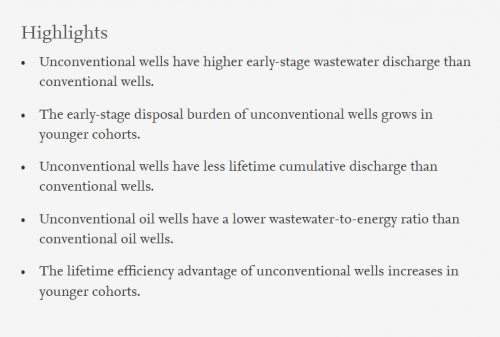Unconventional energy extraction has been accompanied by a faster increase in aggregate wastewater generation compared with conventional practice. Understanding the extent to which it is due to technologies, energy production, or geological characteristics has implications for reducing the associated environmental risks. The paper analyzes how wastewater generation patterns differ between unconventional wells and conventional wells, accounting for differences in well configurations and local geology. Using the 2008–2016 monthly production data from 50,039 wells, the authors show that unconventional wells generated more wastewater in the first 12 months of production but less cumulative discharge than conventional wells. Unconventional oil wells had a lower wastewater-to-energy ratio throughout their lifetime than their conventional counterparts, whereas no efficiency gap existed among gas wells. The paper finds both an increasing initial discharge gap and growing efficiency gains between unconventional wells and conventional wells starting production in more recent years, likely due to increased penetration and persistent improvements of unconventional technologies over time. These findings call for targeted strategies to balance the short-term disposal burden and the long-term efficiency gains of unconventional energy extraction.

Does Unconventional Energy Extraction Generate More Wastewater? A Lifetime Perspective
Published in Ecological Economics
